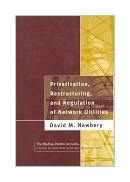|
||
• wydawnictwa polskie
• Zamów informacje o nowościach z wybranego tematu • kontakt
• Cookies na stronie |
PRIVATIZATION RESTRUCTURING AND REGULATION OF NETWORK UTILITIESNEWBERY D.wydawnictwo: MIT PRESS , rok wydania 1999, wydanie Icena netto: Privatization, Restructuring, and Regulation of Network Utilities Network utilities, such as electricity, telephones, and gas, are public utilities that require a fixed network to deliver their services. Because consumers have no choice of network, they risk exploitation by network owners. Once invested, however, a network's capital is sunk, and the bargaining advantage shifts from investor to consumer. The investor, fearing expropriation, may be reluctant to invest. The tension between consumer and investor can be side-stepped by state ownership. Alternatively, private ownership and consumers' political power can be reconciled through regulation. Either way, network utilities operate under terms set by the state. David Newbery argues that price-setting rules comprise only part of the policy agenda. Network utilities pose special problems of ownership and regulation. He discusses the history of ownership and regulation, privatization, and theories of regulation. Examining three network utilities in detail telecoms, electricity, and gashe contrasts the regulatory approaches of Britain and the United States. He also looks at liberalization in a variety of other countries. History shows that the mature forms of regulatory institutions are remarkably similar under both public and private ownership. This raises obvious questions such as: Will the forces that caused convergence to regulated vertical integration in the past reassert themselves? Can the benefits of competition be protected against the pressure to reintegrate? Will different utilities differ in their form and structure? A full understanding of the forces shaping regulatory institutions is necessary to answer these important questions. "David Newbery reviews with the eyes of an outstanding microeconomist a wealth of empirical cases of deregulation, liberalization, and privatization in three major network industries (electricity, telecommunications, and gas) to assess how structural reforms can improve long-run performance. His book is a welcome complement to a literature often narrowly concerned with short-run efficiency." Jean-Jacques Laffont, Institut d'Economie Industrielle, Toulouse, France "What distinguishes this book is the unique combination of intellectual rigor, hard-nosed policy realism, and expert analysis of recent developments around the world. A lucid and authoritative source for scholars and policy makers." Mark Armstrong, Oxford University "David Newbery brilliantly combines theory and empirical evidence in a penetrating analysis of key regulatory issues in the transformation of network industries." Lars Bergman, Professor of Economics, Stockholm School of Economics "An authoritative and comprehensive study, blending theory with empirical and political insights, by a leading expert of structural and regulatory reforms in network industries. It deserves to be widely read by policy makers and practitioners in network industries and students of such reforms." Einar Hope, Professor of Energy Economics, Norwegian School of Economics and Business Administration David M. Newbery is Director of the Department of Applied Economics at Cambridge University. He has been an advisor to the electricity, gas, and rail regulators in various countries. 466 pages Księgarnia nie działa. Nie odpowiadamy na pytania i nie realizujemy zamówien. Do odwolania !. |


